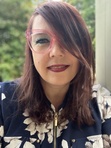I wrote my latest book at least partly because I felt that we owe Gaza a debt we will never be able to repay.
 Photo credit: Sarah KohlerKathryn Mockler: What is your first memory of existing?
Photo credit: Sarah KohlerKathryn Mockler: What is your first memory of existing?Saeed Teebi: I am perhaps four years old. We are in London, UK, where we lived for a year. We are on our way home from my preschool. I am holding my mother’s hand, wearing a blue mackintosh. It is miserable: foggy, raining, and, without warning, nighttime. The wind is in our faces, heavy, heavy. I am struck by how immobile we are. I am exerting force to move my legs and torso forward, but it wasn’t working. We aren’t going anywhere. I panic. Will we ever progress?
KM: What is your first memory of being creative (writing, art making, etc.)?ST: Dreaming up scenarios for how, actually, it was my brother who did it.
KM: What is the best or worst dream you ever had?ST: With rare exceptions, I forget my dreams as soon as I wake up. They sometimes leave a trace of joy or anxiety, but it dissipates before I reach the bathroom. Maybe paradoxically, I am a good interpreter of the dreams of others.
KM: Do you have a preferred emotion to experience? What is it and why?ST: Wouldn’t everyone prefer the most saccharine kind of emotion that gives us the most direct pleasure? Do we have to evince nuance and sophistication even in our innermost cravings for feeling?
KM: Can you recount a time (that you're willing to share) when you were embarrassed?ST: I was maybe nineteen, trying to sound cool to a bookseller. “That book is the epitome of stupidity,” I said, pointing at something. He answered: “Did you mean the epitome of stupidity?” I will let you imagine how far apart we were on pronunciation, and for how many years I winced at this memory.
KM: What do you cherish most about this world?ST: The scraps of connection to others that have survived with me, usually despite my best efforts.
KM: What would you like to change about this world?ST: How cruelty has become both effortless and mundane.
KM: What advice would you give to your younger self? Your younger self could be you at any age.ST: Live slower. The things you are so eager to reach will, in the vast majority, not feel as valuable when you reach them.
KM: If you could send your love to anyone, who would it be and why?ST: To Gazans. And I admit that, of all that I want to send them, love would be the least of it.
KM: Tell SMLTA readers about your latest book.ST: I wrote my latest book at least partly because I felt that we owe Gaza a debt we will never be able to repay. It is called You Will Not Kill Our Imagination: A Memoir of Palestine and Writing in Dark Times.
Saeed Teebi is an award-winning writer and lawyer. His latest book is titled You Will Not Kill Our Imagination: A Memoir of Palestine and Writing in Dark Times, and is out in September 2025. His debut short story collection, Her First Palestinian, was a finalist for several awards, including the Atwood Gibson Writers' Trust Prize. Born in Kuwait, Saeed resettled in the United States, then Canada. He lives in Toronto. Text within this block will maintain its original spacing when published
You Will Not Kill Our Imagination
by Saeed TeebiSimon & Schuster, 2025
Text within this block will maintain its original spacing when published
You Will Not Kill Our Imagination
by Saeed TeebiSimon & Schuster, 2025Buy You Will Not Kill Our Imagination
A vital, fearless memoir explores what it means to be a Palestinian in this moment, the effects of the genocide on Palestinian art and imagination, and that to even claim a belonging to the land from a country thousands of miles away is an act of subversion—a book that Omar El Akkad says “so perfectly contextualizes and humanizes so much of what has led us to this awful moment, and one that will be remembered long after.”
Imagination is a more powerful force than hope.
Acclaimed author Saeed Teebi was at work on his first novel when the attacks on Gaza began in late 2023. The violence and cruelty of the attacks, accompanied by the assent and silence of international governments, stunned many across the globe, like Teebi, into a new state of permanent horror.
What does it mean to be of the Palestinian diaspora in such a moment? What does it mean to be of a people who have sustained such a large-scale assault not only on their homeland, but their entire identity? What is the role of art, of language—of imagination—in asserting one’s identity, when that very assertion is read as an act of subversion?
In this incisive work, Teebi explores, with searing, razor-sharp prose, the effects of genocide on the bodies, minds, and imaginations—of Palestinians especially, and humanity in general.
This is at once a memoir of one family’s displacement, a scathing indictment of global complicity in the face of brutality, and a profound rumination on art and imagination as a means of defiance. It is an astonishing work of resistance by a major intellect, and it is both urgent and timeless.
Bluesky | Instagram | Archive | Contributors | Subscribe | About SMLTA



